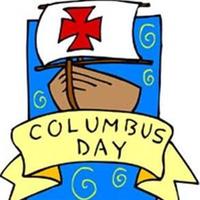15. Columbus Day –A Holiday to Remember an Explorer
15\. يوم كولومبوس - عطلة لتذكر مستكشف
15. Dzień Kolumba - święto upamiętniające odkrywcę
15. Dia de Colombo - Um feriado para recordar um explorador
15. Kolomb Günü - Bir Kaşifi Hatırlamak için Bir Tatil
15.哥伦布日--纪念探险家的节日
Columbus Day is observed on the second Monday of October in the United States, and in some other countries around the world.
يتم الاحتفال بيوم كولومبوس في يوم الاثنين الثاني من شهر أكتوبر في الولايات المتحدة ، وفي بعض البلدان الأخرى حول العالم.
O Dia de Colombo é comemorado na segunda segunda-feira de outubro nos Estados Unidos e em alguns outros países ao redor do mundo.
美國和世界其他一些國家於十月的第二個星期一慶祝哥倫布日。
For a long time it was observed on a specific date, October 12.
||há|||||||específica||
لفترة طويلة لوحظ في تاريخ محدد ، 12 أكتوبر.
Durante muito tempo foi observado em uma data específica, 12 de outubro.
在很長一段時間裡,這一天都是在一個特定的日期——10 月 12 日——被觀察到的。
It is named after Christopher Columbus, the Italian sailor who led three Spanish ships to claim new lands in 1492.
||||Cristóvão|Colombo||italiano|marinheiro||liderou|||navios||reivindicar|novas|terras|
سميت على اسم كريستوفر كولومبوس ، البحار الإيطالي الذي قاد ثلاث سفن إسبانية للمطالبة بأراضي جديدة في عام 1492.
Tem o nome de Cristóvão Colombo, o marinheiro italiano que liderou três navios espanhóis para reivindicar novas terras em 1492.
它以意大利水手克里斯托弗·哥倫布 (Christopher Columbus) 的名字命名,他於 1492 年率領三艘西班牙船隻佔領了新的土地。
There is even a child's poem remembering the date.
甚至還有一首兒童詩來紀念這個日期。
It reads, " In 1492, Columbus sailed the ocean blue".
||||navegou|||em
Lê-se: "Em 1492, Colombo navegou no oceano azul".
上面寫著:“1492年,哥倫布航行在藍色的海洋上”。
Some people say Columbus "discovered" North America, although not everyone agrees with this interpretation.
|||||||embora|nem|todos||||interpretação
Algumas pessoas dizem que Colombo “descobriu” a América do Norte, embora nem todos concordem com esta interpretação.
有人說哥倫布“發現”了北美,儘管並非所有人都同意這種解釋。
For example, Columbus never landed on North America proper.
|por exemplo|||aterrissou||||propriamente
Por exemplo, Colombo nunca desembarcou na América do Norte propriamente dita.
例如,哥倫布從未登陸過北美本土。
He only got as far as to the islands in the Caribbean Sea.
||||até||||ilhas|||Caribe|mar
Ele só chegou às ilhas do Mar do Caribe.
他只到達了加勒比海的島嶼。
Columbus Day has been a federal holiday since 1937; government offices, schools, and post offices are closed.
O Dia de Colombo é feriado federal desde 1937; repartições governamentais, escolas e correios estão fechados.
Many Italians take the day as a day to celebrate their own ethnic heritage since Columbus was born in Genoa, Italy.
|||||||||||||herança||||nascido|||
Muitos italianos aproveitam o dia para celebrar a sua própria herança étnica desde que Colombo nasceu em Génova, Itália.
Columbus's explorations, however, were conducted in the name of Spain.
||||conduzidas|||||
As explorações de Colombo, porém, foram conduzidas em nome da Espanha.
然而,哥倫布的探險是以西班牙的名義進行的。
Major cities, like New York City and San Francisco, host large parades.
|||||||||||desfiles
Grandes cidades, como Nova York e São Francisco, hospedam grandes desfiles.
紐約和舊金山等主要城市都會舉辦大型遊行。
Some cities, like New York City, also hold a parade celebrating the Hispanic or Latino community.
Algumas cidades, como Nova York, também realizam um desfile celebrando a comunidade hispânica ou latina.
紐約市等一些城市也會舉辦慶祝西班牙裔或拉丁裔社區的遊行。
Not everyone thinks Christopher Columbus should be honored.
|||||||honrado
Nem todo mundo acha que Cristóvão Colombo deveria ser homenageado.
Some states like South Dakota do not observe the holiday at all.
Alguns estados como Dakota do Sul não celebram o feriado.
南達科他州等一些州根本不慶祝這個節日。
Instead they call the day Native American Day or Indigenous Peoples Day.
em vez||chamam|||Indígena||||||
Em vez disso, eles chamam o dia de Dia do Nativo Americano ou Dia dos Povos Indígenas.
In Hawaii the holiday is also known as Landing Day or Discoverer's Day.
||||||||Dia do Desembarque||||
No Havaí, o feriado também é conhecido como Dia do Desembarque ou Dia do Descobridor.
This is because European arrival in North America meant the loss of land and lives for many Native people.
||||chegada||||significou||perda||||||||
Isso ocorre porque a chegada dos europeus à América do Norte significou a perda de terras e de vidas para muitos povos nativos.
Many people hold protests or vigils on this day to remember the Native Americans that were killed or enslaved as a result of the European arrival.
||realizam|||vigílias||||||||||foram|mortos||escravizados|||resultado||||
Muitas pessoas realizam protestos ou vigílias neste dia para lembrar os nativos americanos que foram mortos ou escravizados como resultado da chegada dos europeus.
許多人在這一天舉行抗議或守夜活動,以紀念因歐洲人到來而被殺害或奴役的美洲原住民。
Another name for the holiday is "Dia de la Raza" which translates into English as Day of the Race.
outro||||||Dia|de|da|raça|que|Dia da Raça|como||||||raça
該節日的另一個名稱是“Dia de la Raza”,翻譯成英文為“Day of the Race”。

